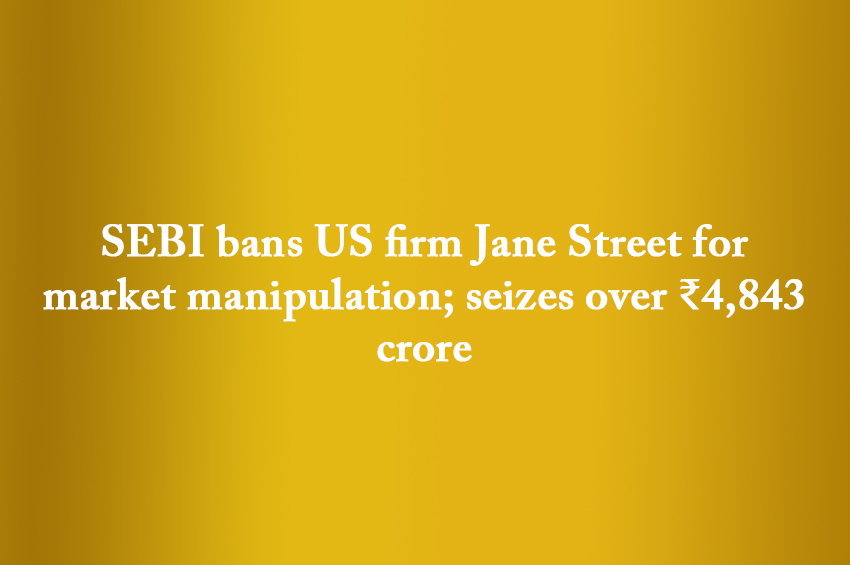Winning Bizness Desk
India’s market regulator SEBI has imposed a trading ban on US-based high-frequency trading firm Jane Street Group and its three associated entities — JSI2 Investments Pvt Ltd, Jane Street Asia Trading Ltd, and Jane Street Singapore Pvt Ltd. The action comes after the firm was found manipulating prices of Nifty 50 and Bank Nifty index options on expiry days. SEBI has ordered the seizure of ₹4,843.57 crore in illegal gains made through such trades.
Intraday manipulation and ‘marking the close’ strategy
SEBI found that Jane Street manipulated the index in two main ways. First, it bought large volumes of Bank Nifty futures and stocks in the morning while simultaneously selling put options — a position that profits when the market rises. Later in the day, it aggressively sold off those positions, pushing the index down and making a profit from the rise in the value of the earlier purchased put options. Second, during the final hour of expiry-day trading, it made high-frequency trades to influence the index’s closing price in its favor — a strategy known as “marking the close”.
Massive gains, minor losses
On January 17, 2024, Jane Street bought shares and futures worth ₹4,370 crore in the morning session and took bearish positions worth over ₹32,000 crore in the options market. By aggressively selling in the afternoon, it caused the index to drop, gaining significantly in options even though it incurred a ₹61.6 crore loss in the cash and futures market. The net profit on that single day stood at ₹673.4 crore. Between January 2023 and March 2025, the firm reportedly earned ₹44,358 crore in options trading, despite losses in stock and futures trades.
SEBI terms actions fraudulent and unfair
SEBI stated that Jane Street violated FPI regulations by using its Indian entities — which were not registered as FPIs — for intraday trades. This bypassed norms that bar foreign investors from such trading. It also said the company engaged in unfair and fraudulent practices by manipulating index prices without economic rationale, harming market fairness and transparency. SEBI acted after media reports in April 2024 raised concerns and NSE flagged issues in February 2025.
Impact on retail investors and future action
Jane Street’s manipulation misled retail investors by creating artificial market movements. On January 17, for example, the Bank Nifty opened sharply lower, partly due to its actions, causing losses to many. SEBI has barred all transactions from Jane Street’s accounts without its nod. The firm has denied wrongdoing and has 21 days to respond. If proven guilty, stricter actions may follow; if cleared, the ban could be lifted.
Know this development through Q&A-
Q1. What is Jane Street Group?
A US-based trading firm that uses algorithms for high-frequency trades, especially in Bank Nifty and Nifty 50 derivatives in India.
Q2. What has SEBI accused it of?
Price manipulation on expiry days through intraday trades and artificially influencing index closing prices.
Q3. How was manipulation done?
By buying futures and stocks in the morning while shorting options, then aggressively selling later to profit from falling indices.
Q4. What were the profits and losses?
Earned ₹44,358 crore in options between Jan 2023–Mar 2025, but faced ₹7,687 crore in other losses. SEBI termed ₹4,843.57 crore of this profit as illegal.
Q5. Which rules were violated?
Broke FPI norms by using non-registered Indian entities for intraday trades; also violated rules against unfair trading practices.
Q6. How did SEBI find out?
Triggered by media reports in April 2024; NSE’s probe followed in early 2025.
Q7. What’s next?
Jane Street has 21 days to reply. SEBI may take stricter actions if the firm is found guilty. The ban may be lifted if cleared.


